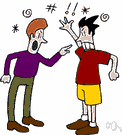expletive
Also found in: Thesaurus, Encyclopedia, Wikipedia.
ex·ple·tive
(ĕk′splĭ-tĭv)n.
1. An exclamation or oath, especially one that is profane, vulgar, or obscene.
2.
a. A word or phrase that does not contribute any meaning but is added only to fill out a sentence or a metrical line.
b. Linguistics A word or other grammatical element that has no meaning but is needed to fill a syntactic position, such as the words it and there in the sentences It's raining and There are many books on the table.
adj.
Added or inserted in order to fill out something, such as a sentence or a metrical line.
[From Late Latin explētīvus, serving to fill out, from Latin explētus, past participle of explēre, to fill out : ex-, ex- + plēre, to fill; see pelə- in Indo-European roots.]
American Heritage® Dictionary of the English Language, Fifth Edition. Copyright © 2016 by Houghton Mifflin Harcourt Publishing Company. Published by Houghton Mifflin Harcourt Publishing Company. All rights reserved.
expletive
(ɪkˈspliːtɪv)n
1. (Linguistics) an exclamation or swearword; an oath or a sound expressing an emotional reaction rather than any particular meaning
2. (Linguistics) any syllable, word, or phrase conveying no independent meaning, esp one inserted in a line of verse for the sake of the metre
adj
expressing no particular meaning, esp when filling out a line of verse
[C17: from Late Latin explētīvus for filling out, from explēre, from plēre to fill]
exˈpletively adv
Collins English Dictionary – Complete and Unabridged, 12th Edition 2014 © HarperCollins Publishers 1991, 1994, 1998, 2000, 2003, 2006, 2007, 2009, 2011, 2014
ex•ple•tive
(ˈɛk splɪ tɪv)n.
1. an interjectory word or expression, frequently profane; an exclamatory oath.
2. a syllable, word, or phrase that serves to fill out a sentence, line of verse, etc., without conveying any meaning of its own, as the word it in It is raining.
adj. 3. Also, ex′ple•to`ry. added merely to fill out a sentence or line, give emphasis, etc.
[1600–10; < Late Latin explētīvus supplementary = Latin explēt(us), past participle of explēre to fill up (ex- ex1 + plēre to fill) + -īvus -ive]
ex′ple•tive•ly, adv.
Random House Kernerman Webster's College Dictionary, © 2010 K Dictionaries Ltd. Copyright 2005, 1997, 1991 by Random House, Inc. All rights reserved.
ThesaurusAntonymsRelated WordsSynonymsLegend:
Switch to new thesaurus
| Noun | 1. |  expletive - profane or obscene expression usually of surprise or anger; "expletives were deleted" expletive - profane or obscene expression usually of surprise or anger; "expletives were deleted"profanity - vulgar or irreverent speech or action |
| 2. | expletive - a word or phrase conveying no independent meaning but added to fill out a sentence or metrical line utterance, vocalization - the use of uttered sounds for auditory communication |
Based on WordNet 3.0, Farlex clipart collection. © 2003-2012 Princeton University, Farlex Inc.
expletive
noun swear word, curse, obscenity, oath, four-letter word, cuss (informal), profanity, rude word He muttered an expletive under his breath.
Collins Thesaurus of the English Language – Complete and Unabridged 2nd Edition. 2002 © HarperCollins Publishers 1995, 2002
expletive
nounThe American Heritage® Roget's Thesaurus. Copyright © 2013, 2014 by Houghton Mifflin Harcourt Publishing Company. Published by Houghton Mifflin Harcourt Publishing Company. All rights reserved.
Translations
kiroussadattelutäytetäytesanatäyttävä
expletive
[eksˈpliːtɪv]A. N (Gram) → palabra f expletiva; (= oath) → palabrota f, improperio m
B. ADJ (Gram) → expletivo
Collins Spanish Dictionary - Complete and Unabridged 8th Edition 2005 © William Collins Sons & Co. Ltd. 1971, 1988 © HarperCollins Publishers 1992, 1993, 1996, 1997, 2000, 2003, 2005
Collins English/French Electronic Resource. © HarperCollins Publishers 2005
expletive
n (= exclamation) → Ausruf m; (= oath) → Kraftausdruck m, → Fluch m; (Gram: = filler word) → Füllwort nt
adj expletive word (Gram) → Füllwort nt
Collins German Dictionary – Complete and Unabridged 7th Edition 2005. © William Collins Sons & Co. Ltd. 1980 © HarperCollins Publishers 1991, 1997, 1999, 2004, 2005, 2007
Collins Italian Dictionary 1st Edition © HarperCollins Publishers 1995